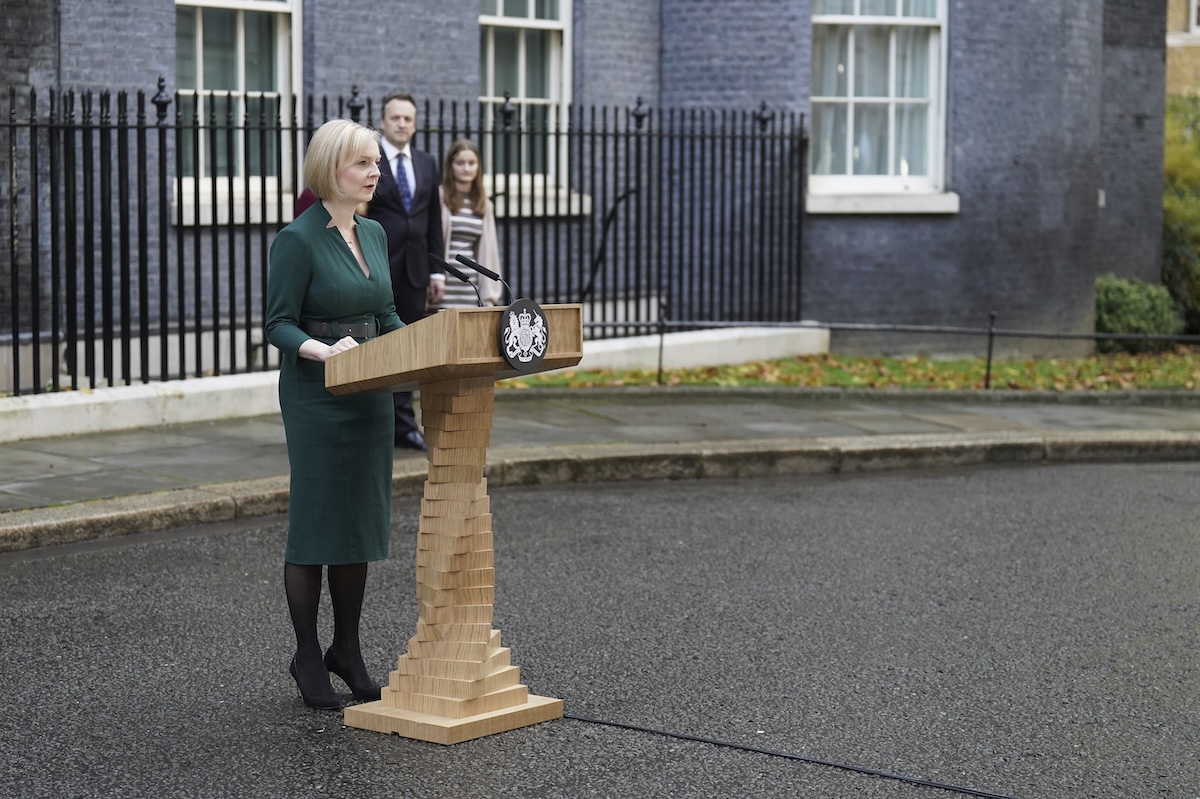Liz Truss’ tenure as the United Kingdom’s prime minister will almost certainly be reduced to two footnotes. First, she was invited to form a government by Queen Elizabeth II during Her Late Majesty’s last public engagement. Second, its historic brevity at just 49 days was reportedly “roughly the shelf-life of lettuce.” She has had a much longer career of public service, having served in the governments of three other prime ministers. Although she left her post as Conservative Party leader and prime minister on October 25, 2022, she has remained in her seat as a member of Parliament, representing the same constituency since 2010. The British people never saw what her Growth Plan, derisively called the “mini-budget” in the press, might have produced through a lowered tax burden and more business-friendly economic policies. She was always a controversial public figure, and the deck was certainly stacked against her as she began her premiership, but her rise to power and turbulent term in office revealed quite a lot about politics in Britain specifically and the West more broadly.
Her recent political memoir, Ten Years to Save the West: Leading the Revolution Against Globalism, Socialism, and the Liberal Establishment, recounts her time serving in various government roles under Prime Ministers David Cameron, Theresa May, and Boris Johnson before devoting the last chapters to her campaign to take the top job through her time in office and ultimate resignation. The consistent theme of her experience as a government minister is frustration with the inertia of entrenched bureaucrats. In every post, she encountered staff inclined to politely receive ministerial advice but disinclined to implement change. Government business, whether in departments tasked with educational, environmental, justice, or foreign policy, was designed to maintain the status quo rather than oriented toward reform for more efficiency or to respond to democratically elected representatives of the people. She concedes that she took this frustration into “No. 10” and assumed that swift, decisive action would not only be possible but effective. That proved to be a fatally flawed assumption.
Unlike the constitutional separation of powers in the United States, the United Kingdom’s executive powers of government arise from the legislature. The prime minister’s office evolved over the course of several hundred years, and today the U.K.’s head of government is the person able to command a majority in the House of Commons, Parliament’s lower house. As a practical matter, that person is almost always the leader of the party with the majority of seats. So the inner workings of the various parties plays a role in determining who the prime minister will be. Potential prime ministers never appear on a national ballot as a candidate for the office; instead they represent their own constituencies from which they are elected. Additionally, there is no set term of office for the prime minister as there is for the U.S. president. National elections must be held every five years by law but can occur more frequently if Parliament calls for them. The term ends when the prime minister can no longer command a majority of the House of Commons or resigns from office for some other reason.
Truss’ pathway to the top job was unique. As Conservative Party leader, Boris Johnson led the Tories to a historic majority in 2019 in the wake of parliamentary logjams regarding Brexit negotiations. This majority gave Johnson a significant mandate in terms of the party’s platform. But COVID-19 struck, and Boris ultimately found himself in the middle of a scandal that revolved around small send-off gatherings for those leaving No. 10. He ultimately resigned. Rather than all of Britain heading back to the polls, the Conservative Party held a leadership contest that culminated in two candidates standing for the position: Liz Truss and Rishi Sunak. Truss emerged victorious with more than 57% of the vote. Given that her ascendency to the premiership did not come by way of a nationwide election, her mandate was more tenuous than Boris’s. But after her resignation, party elites dispatched with appealing to party membership to select a new leader, and placed the establishment candidate, Rishi Sunak, the current prime minister, in the office, leaving him vulnerable to the criticism that he lacks a viable mandate to hold the office.
Truss’ account of the leadership contest and her brief time in office is most interesting if understood not as her own justification of her policies and political performance but as a radar ping that reveals some of the dysfunctions of politics in the U.K specifically and the West more broadly.
If Truss’ account is accurate, the establishment was against her from the start. Truss’ account of gaffes, campaign inefficiencies, and strategic missteps certainly are consistent with what was visible to those observing from the outside. The lack of concern over the declining democratic legitimacy of each successive government from Johnson to Truss to Sunak certainly suggests that a relative few within the Conservative Party enjoy outsize influence over the party. Truss doesn’t suggest a conspiracy theory with a cabal of operatives at the center, but rather a party leadership with interests and power concentrated in London and unresponsive and disconnected from the rank-and-file party membership and British voters more broadly.
In her final chapter Truss lays out the lessons she believes the West should learn from her time in office and urges us to do so within 10 years, thus the title of the memoir. I more or less agree with the points she argues. Each is focused on smaller governments more responsive to democratic accountability, alliances among Western nations with shared history and values, the reassertion of national sovereignty in the face of supranational and international bodies gaining more power, and a strong economic and political stance against despotism and authoritarianism. All these basics couldreverse troubling trends if they were realizable. But Truss’ story illustrates, unfortunately, that the odds are stacked against such implementation without more fundamental, systemic reforms.
First, Western democracies need structural reforms rather than just policy changes. Throughout her career as a government minister, Truss found that the problems she faced were related to implementation. Government ministries were filled with bureaucrats in secure positions with no particular loyalty to a specific government or minister. Firing them would be nearly impossible, so there were very few mechanisms for any government to prod them to act. These government employees should be neutral functionaries, but this is a nearly impossible demand of human beings with their own interests, experience, and biases. So systems that incentivize responsiveness and action are necessary if policy changes are to have any meaningful effect.
It sounds as if the problem that Truss has faced throughout her career is even worse than the bureaucratic malaise that can be found in Washington, D.C. It’s not as easy for the U.S. president to reshuffle the bureaucracy with new executive departments requiring congressional action and the highest executive offices requiring Senate confirmation. But the reality that emerges in both contexts is that government becomes an end in itself rather than an institution that serves nobler ends. Western governments are ideally guarantors of liberty, but how can they fulfill that role when self-preservation rather than liberty itself becomes their ultimate goal?
Second, Truss was dealing with a system designed to discourage bold action. By definition, “the establishment” prefers political actors like Hillary Clinton rather than Bernie Sanders, Jeb Bush rather than Donald Trump, or Rishi Sunak rather than Liz Truss precisely because they are no threat to the established order of doing things. There is much to be said about constancy and predictability—in fact, that is the ideal. But there is no space to admit policy failure when the “system” that implements government policy is existentially invested in those policies. The system protects itself and resists those who might present a challenge to it.
Democratic institutions through which political policy is articulated or enacted into law are rightly designed to be inefficient because they require deliberation, compromise, and consensus building. Particularly bureaucratic examples stumble into inefficiency as a means of self-preservation. Once clarity emerges from democratic institutions, bureaucratic resistance is a slow, plodding threat to democracy every bit as much as more violent or active ones. The difference is not substantive, but qualitative. The first is possibly more pernicious because of its subtlety.
Finally, the size of major political parties makes them coalitions in themselves even if not formally. The Conservative and Labour Parties in the U.K. are diverse, and the campaign platforms that emerge must offer enough to each group within to keep the coalition viable. The same is true for the Democratic and the Republican Parties in the U.S. These are, as we have seen in the past decade, dysfunctional coalitions at best. This reality makes Truss’ final recommendations difficult to realize. The spectrums of positions represented by individual party members means that policy positions and campaign promises must often be generalized to the point of meaninglessness and articulated with ambiguous language that creates an ideological Rorschach test enabling various factions within the party to understand them according to their priors. Factor in a party’s priority for electoral success rather than effective governance, and it is clear why there is so little creative and innovative policy work done on either side of the Atlantic.
Liz Truss’ premiership will prove ultimately to be no more than the answer to a trivia question, and her approach to government, which she calls popular conservatism, will never be tested. But had she not risen to the U.K.’s highest political office, it would have been impossible to shine such a public light on some of the gross political dysfunctions that now present a threat to Western democracy. I hope that Ms. Truss is right and that there is still time—even if that time is short—to “save the West.” But it is clear that such a reclamation project will be an enormous undertaking up against some tough odds.

